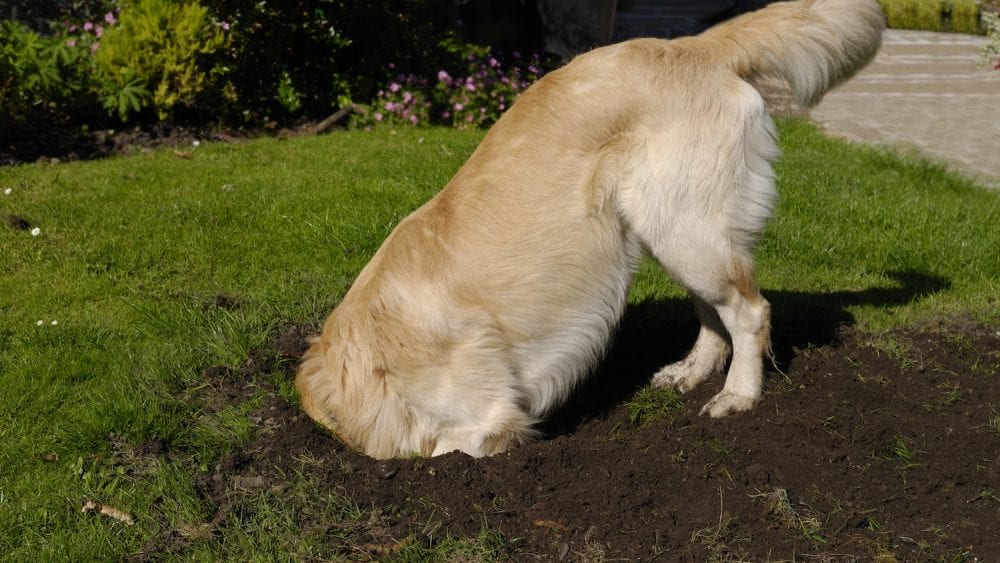
Dogs that dig: tips to prevent it
Dogs that dig do so for several reasons but the most common is sheer boredom and frustration. You can stop this destructive habit by following these few tips from veterinarian, and keen gardener, Dr Belinda Roxburgh:
Gardening with dogs might seem like an impossible task but with a bit of foresight you and your dog can enjoy your garden together.
Dogs that dig: think before you plant
Exercising your dogs outside of the property, especially off a lead, is always first prize. However, dogs do get a lot of exercise doing the job they love most, which is defending your home. Keep this in mind when planting along the boundary – leave a metre gap for a runway along the fence which can easily be kept clear. Before planting, take into consideration the natural paths the dogs take. Some people like to pave those paths and it is also possible, if necessary, to redirect the flow of dog traffic using barrier plants or pot plants. Although, designing your garden in a way that allows their running and barking fun up and down the fence means there should be no need to put barriers in place to protect your plants. An excited, sizeable dog plows through most barriers eventually, which can be frustrating for you and may harm your dog.

Dogs that dig: the look out
Dogs that dig usually do so because they are bored or frustrated. Imagine being behind a 6ft wall all day and hearing sounds on the other side that you cannot see. It’s like being locked in a prison cell! It is vital that they can see out, preferably the entire perimeter but at least at some strategic places. If there is a solid wall around your property, try to create some windows at dog-eye level. Many pet owners with Vibracrete walls have, for example, removed a panel and replaced it with steel bars so that their dogs can see out. If you have a front gate, keep your dog in mind. Being able to see out is essential for stimulation which counteracts boredom and associated issues like digging and destructive chewing. It also gives a dog a sense of security and wellbeing when they’re able to keep a good look out.
Give them a raise
Shade, water and protection from the elements goes without saying but if your dog’s daybed or favourite look out point could be raised in some way this will only add to his or her sense of safety and confidence. A deck with a view is the ideal. Mine love to lie on the trampoline!

Direct his digging to suit you
Encourage an enthusiastic digger to dig where it suits you by burying bones in those areas. When your dog digs in inappropriate places, before refilling, place some of his own poop in the hole. He’ll learn very quickly that this is a no dig zone.
Unfortunately, destructive digging often occurs because dogs are bored and left alone for hours on end. Dogs are sociable creatures and love company. If you have to leave yours alone, ensure there is a good supply of toys and chews to keep him happy for a few hours. If you’re at work all day and he’s alone, explore the idea of doggy day care. It’s kinder to your dog, and kinder to your garden.
In the beginning, giving treats when leaving the property and a whistle/treat/pat when coming home will quickly train him not to run out when you open the gate.
Positive reinforcement and attention means happy, contented dogs who bark appropriately and not continuously when you go out. They will be far less likely to behave destructively when left alone or show other symptoms of separation anxiety like digging up the garden or trashing the irrigation.
Create a worm farm
Gardening with dogs has actual payoffs too. If you have a garden big enough for a dog or two, then a worm farm is very useful endeavour. Composting worms love dog poop, turning it quickly and safely into nutritious plant food. This means you never need to put it in a plastic bag and into the black bin ever again. Win-win all round. If this doesn’t appeal to you, another option that works very well is a bokashi bin which also happily takes anything that the worms don’t like such as citrus, onion or chillies as well as any kitchen waste. When the bin is full the contents can be safely buried in the garden to form compost under the ground. This can be left there or dug up to be used at a later stage. Compostable poo bags can also be added to a worm farm or bokashi bin.
Watch out for ticks
So many pet owners believe they don’t have ticks in their own gardens, and that their dogs will only pick up ticks if they go to a dog park or the veld. Not true. Ticks are everywhere, and they cause life-threatening illnesses like biliary. Keep your dogs protected all year round by applying long-acting parasite control such as Bravecto or Nexguard.
Over the years I have treated many dogs with neurotic issues such as lick granulomas (a skin injury caused by chronic licking), obesity, aggression, separation anxiety and excessive barking. Often these conditions stem from boredom, low confidence and lack of attention. Sometimes these dogs come from dysfunctional families and many of these problems could have been prevented with a little focus and training plus a dash of mindful gardening. Dogs all need love, exercise and stimulation. Gardening with cognisance of our dogs’ natural movements and needs can be most satisfying for all involved.
Our pets are part of our communal ecosystem which means the more we can integrate them into our daily lives in a sustainable, environmentally friendly way the happier and healthier our communities.
